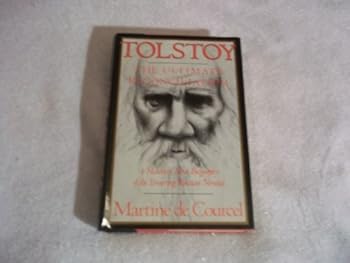Tolstoy: The Ultimate Reconciliation
No Synopsis Available.
Format:Hardcover
Language:English
ISBN:0684185695
ISBN13:9780684185699
Release Date:January 1988
Publisher:Scribner Book Company
Length:458 Pages
Weight:1.90 lbs.
Customer Reviews
1 rating
"The Place Where He Wanted To Be Alone"
Published by Thriftbooks.com User , 18 years ago
The title of my review is taken from the very last page of de Courcel's book; Tolstoy dictated it in English to Chertkov to send to his English translator, Aylmer Maude. Death, in the end, was that place: the ONLY place he could be alone, the only place he could escape his own inner contradictions to, because he populated his world with the incarnations of those contradictions, notably, of course, his disciple Chertkov and his wife Sof'ya, and his daughters who took Chertkov's side and his sons who took his wife's. Having lost his mother at 18 months and his father at age nine, he was desperate for love, and surrounded himself with people who loved him desperately, clingily, manipulatively, demandingly; and he could not live with that love, so he made sure that it would take intolerable forms, which he would need to escape, over and over. His escape to the monastery, and then the convent where his sister was a nun, and then to the train station at Astapovo, where, in the midst of an incredible media circus, he finally died of pneumonia at age 82, was of course no escape at all: the fame that he had dreamed of and dreaded ensured that he was followed there too, by all the primaries in his psychomachy. At first, reading de Courcel's biography, I thought she was too pious toward Tolstoy. All the positives were emphasized, almost romanticized; the few problems seemed downplayed. As the book progressed, however, it felt like de Courcel was writing herself into a deeper and more troubled understanding of her subject, and the writing became darker, more disturbing, also more powerful. By the end, she is so brilliantly in control of her subject that the last section, "The Last Days," is absolutely excruciating. While perhaps inclined to take Sof'ya's side in the Sof'ya/Chertkov wars--perhaps because de Courcel too is a woman?--she doesn't really take sides at all; she shows us the horrible things both Sof'ya and Chertkov were doing to each other and to Tolstoy, and (to me the strongest aspect of the book) shows how Tolstoy's inner contradictions brought it all on himself. De Courcel's education is in Freudian psychoanalysis, and it shows in the book; but her psychoanalytical touch is light, and really doesn't emerge fully until her wonderful last chapter, "The Outcome." (For a full-fledged Freudian psychoanalysis of Tolstoy, also by a French woman, but this one herself a psychoanalyst, see Annie Anargyros-Klinger's "The Thread of Depression Throughout The Life And Works Of Leo Tolstoy," translated by Elaine Bolton (The International Journal of Psycho-analysis 83.2 (2002): 407-18). The impression de Courcel gives throughout the book is not one of a dogmatic Freudian forcing everything to fit Freud's categories, but rather one of a deeply insightful, thoughtful, and analytical human being who is able to summarize Tolstoy's complexities with literary grace and flair, with an almost poetic economy. There are some things that bother me about this translat






